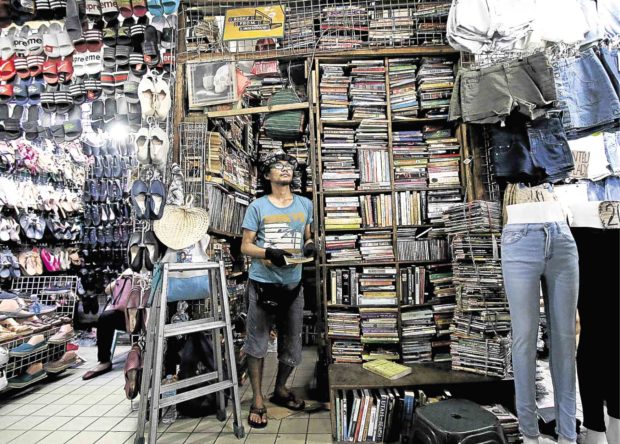Notes – and rare books – from the underground

SUBTERRANEAN SALE. Towering piles of secondhand books and assorted goods from nearby stalls dwarf bookseller AJ Laberinto whose shop, Books from Underground, offers rare publications and first-edition titles. —RICHARD A. REYES
At the heart of a dank underpass that links the Manila City Hall to the golf course outside the walls of Intramuros, Sigmund Freud hangs out with Ninoy Aquino and Gabriel Garcia Marquez.
The three are among the popular subjects or authors of books showcased in the 1.5-square-meter space occupied by an independent secondhand bookstore that calls itself and sells, what else? Books from Underground.
To see the books, one needs to go down a dark and humid passageway that reeks of sewer water and urine.
Cheap boutiques flank the book stall manned by eccentric bookkeeper AJ Laberinto, who is himself a rare find.
When Inquirer reached Laberinto last week, he was wearing black shorts, mountaineering gloves and a plaid Fedora hat topped by a headlight, a getup ideal for worming into tunnels to mine for gold and precious stones.
Article continues after this advertisementThat’s probably how Laberinto regards his wares that range from rare Filipiniana magazines, classics and first editions, to current best-sellers.
Article continues after this advertisementAmong the titles one can find at the book shop are the national artists of the Philippines in paperback; a collection of Mr & Ms magazines, including the special issues on the Ninoy Aquino assassination during the Marcos regime; Granta books; and the 1970 edition of The Archipelago by National Artist for Literature Cirilo Bautista.
For ideas that changed and moved the world, the books come cheap, around P50 a copy.
The Filipiniana magazines and first edition, say of Garcia Marquez’s “One Hundred Years of Solitude,” could cost you about P500.
Decade-old business
The 37-year-old entrepreneur from Blumentritt, Manila, has been running the store with his friend Winter for over 10 years now.
It wasn’t exactly Laberinto’s dream. Actually, he did not have any dream at all, he said.
As a young man, all he wanted to do was read and live. Now, he admitted, he has been soldiering on because he wants “to survive.”
“I don’t think I’d do this for the rest of my life. This business is for the young and able,” he said.
The idea to sell books started among a group of friends in the late ’90s.
The students from the Philippine Normal University enjoyed reading and collecting books, and sold their collection inside the campus to support their education.
Years later, after earning some P10,000 at an event at the University of the Philippines in Diliman, Quezon City, Laberinto decided to sell books as a full-time job.
After all, he knows where to find cheap books all over Metro Manila from “America’s junk” to Recto’s offerings.
Shooed away
At the corner of Taft Avenue and Padre Faura, “the street of intellectuals,” as he called it, Laberinto and his friend made good business until they got arrested for spreading their wares on the street.
The two decided to move to a space fronting the Manila City Hall, but just like in Faura, they got shooed away.
Fortunately, somebody invited them to sell inside the City Hall underpass where they’ve set up shop since.
The small business may not turn them into millionaires—not by a long shot—but Laberinto said there’s enough income to make them continue the trade.
Although competition may be tough with so many secondhand bookstores in the Metro, Books from Underground offer customers more choices, the bookseller said.
And if the desired titles are not available in their inventory, Laberinto said they’d happily find them for their customers.
Found via Facebook
Like other businesses, they’ve had their ups and downs. Laberinto recalled how Books from Underground lost around P500,000 when floods triggered by monsoon rains inundated Manila in 2012 and 2013.
Then there’s social media. But contrary to the notion that the internet has kept people away from books and the print media, Laberinto said they find their customers through their Facebook accounts. Their stall serves mainly as a pickup point for the books ordered by Metro Manila customers.
Customers from as far as Davao and La Union ask for their books to be shipped to them.
Still, with digital books available on the internet, are hard copies of books still in vogue? the Inquirer asked.
Laberinto chuckled and snapped back: “If they weren’t, we wouldn’t have lasted a decade, right?”